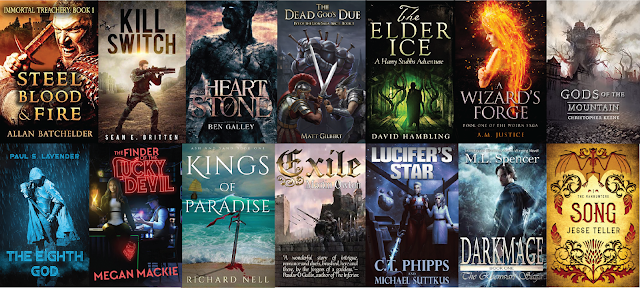Picking Their Brains: Best Self-Publishing Advice to Help Authors Succeed
One of the perks of my obsession with fantasy books is stalking—I mean, getting to know—the authors themselves. You might not realize most of them are super friendly, helpful people who want their fellow authors to succeed as well. I asked a group of them the following question, and with almost no “persuading,” I was able to collect self-publishing advice from these experienced authors.
What is something about self-publishing that is different than what you expected, or something about it you wish you’d figured out sooner?
“The marketing can take as much or more time than the writing, if you’re not careful.” —Allan Batchelder, author of Steel, Blood & Fire
“Ego is not a dirty word. If you don’t believe that out of all the books in the world, yours is worth the time spent reading it then why put it out there at all?” —Sean E. Britten, author of Kill Switch
“Never assume you’re alone in this market. Writing is almost always a solitary affair, and even more so as a self-published author, where you’re responsible for all the facets of publishing and marketing. No matter how easy other authors make it look, no matter what success you perceive in others, remember that they too have down days, doubts, fears, and that they too have stared for hours at somebody else’s progress and thought, “why isn’t that me?”. We authors may write solitarily, but we are all in the same boat, dealing with the same issues. Remembering that will keep you going and give you solace and encouragement when it’s most needed.” —Ben Galley, Fantasy Author & Self-Publishing Consultant, bengalley.com
“Write for you, first. Financial success is not assured, and self-doubt will cripple you quicker than a train-wreck if you let it. If you have a plan for something grand and sweeping, resolve from the outset that no matter what, it will get finished to the best of your ability.” —Matt Gilbert, author of The Dead God's Due
“Abandon hope all who enter here. Expect nothing. While your family and friends are probably useless for practical editing and advice, they are essential for the emotional support you will need. And keep writing!” —David Hambling, author of The Elder Ice
“Community is important. At any level of publishing and writing.” —Matthew Johnson, Professor Grimdark
“Don’t rely on family and friends to promote your work. You’ll only be disappointed. Be prepared to spend resources: money, time, or both. Believe in yourself. Your family and friends may not provide any support at all (dare I say...especially if you’re a woman), but you have to follow your gut and MAKE time to make art.” —AM Justice, author of A Wizard’s Forge
“If your publisher doesn’t want to do an audiobook, try to get the audiobook rights back and self-publish it!” —Christopher Keene, author of Gods of the Mountain
“Don’t rely on family and friends for honest advice. They are biased and don’t want to hurt your feelings. GET AN EDITOR!!!” —Paul Lavender, author of The Eighth God
“Get words on the page. Don’t worry about the right words, or the exact words, get the words down. Tell the story, push through, force your way to the end, don’t worry about whether it makes sense or has holes, that’s what revisions and development editors are for. Complete the first draft. GET THE WORDS ON THE PAGE.” —Megan Mackie, author of The Finder of the Lucky Devil
“Remember you are a writer first, and a marketer second. Also...maybe don’t make your first book a 600 page epic.” —Richard Nell, author of Kings of Paradise
“Getting reviews is d#mn difficult, maybe 1 in 15 of the reviewers you contact will result in you getting a review.” —Martin Owton, author of Exile
“Don’t expect to make a fortune on your fourth book or even fortieth. Write because you love to and succeed because your audience finds you.” —CT Phipps, author of Lucifer’s Star
“Force yourself to stand up every hour and do something active. Take good care of your hands. And—above all else—hire an editor, whether you need one or not.” —ML Spencer, author of The Rhenwars Saga
“Write more. Write all the time. The idea is that people will read your work if they can see your name and keep up with your career. We get more attached to writers when we can read more than one book they have written. So keep typing, put out good work often. Keep your name out front with new releases. And when you are done writing, take a shot of whisky and get back to writing. And find friends. Help them, they will help you. Be proud of other people’s successes. No great art is created in a vacuum. Artists need to feed off of each other, to rub up against other people’s ideas and hear what other people have to say about the job they are doing. Talk to writers about writing. You will find that most of the time writers want to talk about this stuff all the time. And write more.” —Jesse Teller, author of The Manhunters
Subscribe to:
Post Comments (Atom)


No comments:
Post a Comment